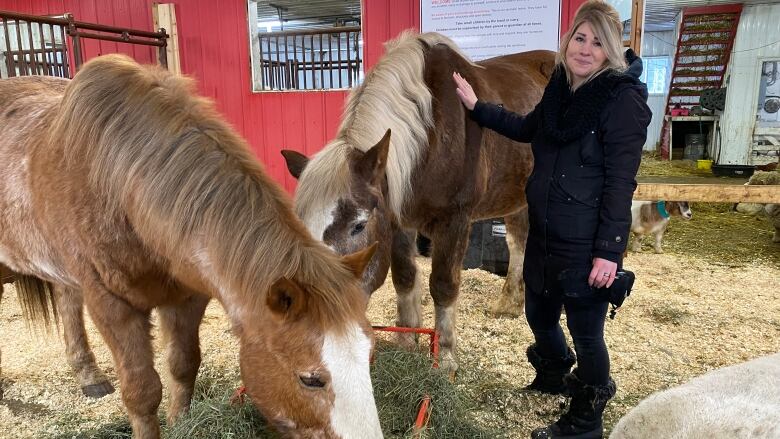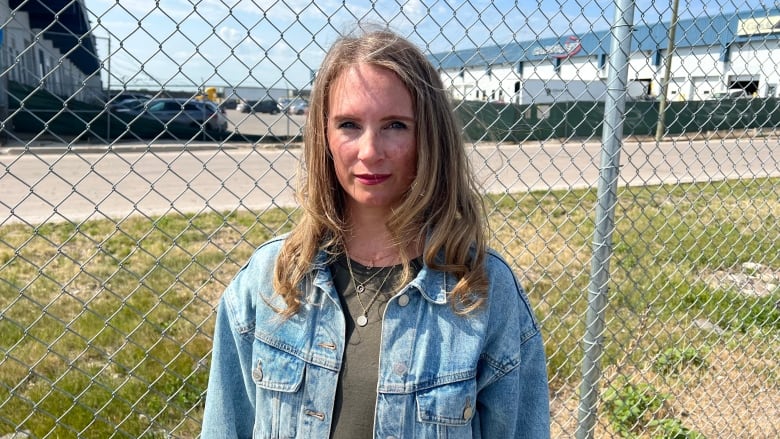Animal rights groups get rare authorization for private prosecution in live-horse export case
'The least that we can do is to make sure that what few laws we do have are actually enforced': Animal Justice

In what's believed to be a firstin relation to farmed animals, a court has given animal welfare advocates the green light to privately prosecute a live-horse exporter in Manitoba.
"We have so few laws on the books to protect these horses,"said Kaitlyn Mitchell, director of legal advocacy with the non-profit groupAnimal Justice.
"The least that we can do is to make sure that what few laws we do have are actually enforced. Otherwise, what good are they?"
The case involves an air shipment of live horses in December 2022 from Winnipeg to Japan. The Korean Air cargo plane was supposed to stop in Anchorage, Alaska, for refuelling and a crew change, but there was a blizzard, so they had to find an alternate route.
That, combined with delays in Winnipeg, meant the shipment exceeded the 28-hour maximum time live horses can be transported without food, water and rest.
Several organizations Animal Justice, the Winnipeg Humane Society, the Canadian Horse Defence Coalitionand Manitoba Animal Save filed a complaint with the Canadian Food Inspection Agency, which acknowledged the breach and confirmed three horses had fallen during the transport, but said there would be no penalty.

"We urged them [CFIA] to take enforcement action, and we were incredibly disappointed when they didn't," Mitchell said.
"Once we realized that the CFIA was not going to take action, then we made the decision to commence this private prosecution."
The group argued three different laws were violated and proposed three separate charges.
After a hearing in Winnipeg Tuesday, a Manitoba provincial court judgeallowed a charge to be laid againstCarolyle Farms a live-horseexporter located in Swan River, Man. under a section of Canada'sHealth of Animals Regulations, which require a contingency planto respond to unforeseen delays that could result in the suffering of an animal.
But the Crown stayed a proposed charge under the regulations for exceeding the maximum time limit for a transport, because it said the CFIA was part of those discussions. It also stayed a proposed charge for causing distress to animals, citing jurisdictional concerns.
"Where did these horses collapse? Was it somewhere over the ocean? We just don't know. So that's frustrating," Mitchell said, adding the case is a rare example of a private prosecutionin which a private individual, rather than public authorities, is permitted by the court to lay a charge for an alleged offence.
"I vividly recall that cold winter night one year ago," saidManitoba Animal Save organizer Danae Tonge, who documented the 2022 shipment.
"I am relieved that the court allowed this charge to be laid and look forward to the next steps in this case."
Farm owner defends decision
Lyle Lumax,the owner of Carolyle Farms, said Tuesday that a phone callfrom CBC News was the first he'd heard of the court action.
He defended the decision to carry on with the December 2022 flight, even though it would exceed the legal time limit.
Lumax, who says he understands and loves horses, said the contingency plan is always to bring the horses back to the farm, but that 10-hour round trip puts even more strain on them.
"I can't exactly remember, but it was something like we were three hours over the 28 hours," he said.
"And everybody involved decided that was far less risky to the horses then putting them back on the trucks, driving back to the farm, loading them and putting them back into the plane and into the crates again."
The Canadian Food Inspection Agency said in a statement to CBC Newsit's aware of the private prosecution, but can't comment on the court's decision because it's reviewing the details.
The agency did say it exercises discretion when deciding to take enforcement action in cases where feed, water and rest intervals are exceeded, and "takes into consideration the harm caused by the non-compliance, the compliance history of the regulated party and whether there is intent to violate federal requirements."
While prosecution is "one option when required for serious incidents of non-compliance," CFIA's statement said "other approaches in the continuum were utilized in this case."
WATCH| Animal welfare advocates filelegal complaint (from Feb. 6, 2023):
Canada is among the leading exporters of live horses, mostly Clydesdales and Percherons, bred specifically for human consumption an industry worth tens of millions of dollars a year.
Raw horse meat sushi is considered a delicacy in Japan. The horses exported sell for up to $9,000 each, Lumax said. The horses are fattened up in Japan before being slaughtered, according to the CFIA.
Mitchell estimates nearly 4,000 horses have been exported from Calgary, Edmonton and Winnipeg in the last year.
In a 2021 mandate letter,Prime Minister Justin Trudeau told his agriculture minister to work towardending exports of live horses for slaughter. Advocates and activists havecirculated petitions and put pressure on the federal Liberals to follow through.
A private member's bill before Parliament now wouldprohibitexportinglive horses from Canada by airfor slaughter.
Mitchell said she will testify before an agricultural committee in Ottawa on Thursday.
With files from Faith Fundal













_(720p).jpg)


 OFFICIAL HD MUSIC VIDEO.jpg)
.jpg)



























































































